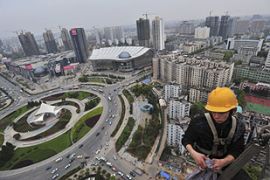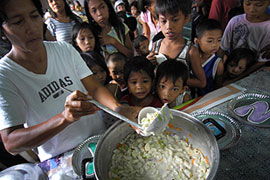Bank slashes Asia growth forecast
Asian Development Bank’s “bleak” outlook sees regional economies sliding.

“There are tremendous downside risks to this global outlook,” Haruhiko Kuroda, the ADB president, said in the report. “The effectiveness of the global responses to the crisis remains uncertain.”
He also described the loud calls for protectionist policies as “worrisome”.
|
“The short-term outlook for the region is bleak as the full impact of the severe recession in industrialised economies is transmitted to emerging markets” Jong-Wha Lee, ADB acting chief economist |
“As job losses in the major industrialised countries continue, the protectionist voices may only get louder,” Kuroda said.
In December, the ADB had forecast that Asia’s average growth would reach 5.8 per cent this year, but added that the global downturn was “having a pronounced impact on the region’s exports and subdued domestic demand will further crimp growth”.
The crisis has highlighted the need for developing nations in Asia to rebalance growth and avoid over-reliance on export-driven expansion, the bank added.
“The pronounced impact of the current global downturn on developing Asia’s growth underlines the risk of excessive dependence on external demand,” it said.
“A wide range of government policies, ranging from boosting domestic consumption to promoting more competitive markets, will be required to facilitate the transition of the region to a more balanced growth path.”
Quick rebound
 |
| The ADB warned more than 60 million Asians will remain mired in poverty [AFP] |
The Manila-based bank however also said that Asia as the fastest expanding region may rebound to six per cent growth next year, if big industrialised nations manage to pull out of recession.
“The short-term outlook for the region is bleak as the full impact of the severe recession in industrialised economies is transmitted to emerging markets,” Jong-Wha Lee, the bank’s acting chief economist, said.
“The concern for the region, and especially for the region’s poor, is that it is not yet clear that the United States, European Union and Japan will recover as soon as next year.”
Slowing regional growth will mainly lead to a setback in poverty alleviation, the bank said, meaning more than 60 million people will remain mired in poverty this year.
Last week a report from the United Nations warned of worsening poverty in the Asia-Pacific region as a result of the global crisis, saying the situation was likely to be exacerbated by unstable food prices and the impact of climate change.
The UN Economic and Social Commission for Asia and the Pacific (Escap) said record-high oil prices last year had contributed to the price of rice, the region’s staple food, going up by 150 per cent.
Escap said food-fuel price volatility and climate change were converging with the global economic slump to create what it called a “triple threat”.